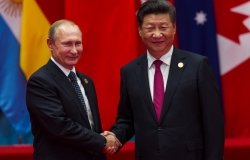Book Discussion: <i>Soft Power and Its Perils: U.S. Cultural Policy in Early Postwar Japan and Permanent Dependency </i>
Speaker: Takeshi Matsuda, Osaka University of Foreign Studies
Overview
Professor Takeshi Matsuda, at a Wilson Center book event October 9, noted that his recently published work, Soft Power and Its Perils, which covers U.S.-Japanese cultural relations from the end of World War II until 1960, is deeply critical of U.S. cultural policy. The central theme of his book is that America's cultural diplomacy created a sense of permanent dependency in Japan. Matsuda asserted that this sense of permanent dependency "persists to the present day."
Matsuda began his presentation by discussing his background, quoting the historian E.H. Carr, who said, "in order to appreciate a history book, one must know the background of the historian." Matsuda noted that he had done undergraduate and graduate work at the University of Wisconsin, and had been a Wilson Center fellow from 2001-02. He was influenced by American progressive traditions and liberal reforms, especially those during the 1910s. He wondered why Japanese who had studied so hard about America after World War II had remained so conservative.
Matsuda asked himself why Japanese specialists on America generally remained silent during times of great crisis in U.S.-Japan relations, such as had occurred during the 1980s, and why the American progressive tradition, with its emphasis on public policy and its call for political action, had not transferred itself into Japanese society,. He also asked why American studies in Japan was so centered in Tokyo, and why these studies were not spread around the country in a more democratic manner. His book is an attempt to answer these questions.
When the war ended in 1945, stated Matsuda, U.S. policy during the Occupation was initially focused on having Japan disarm and making Japan into a democracy. As the Cold War intensified after 1947, U.S. policy shifted toward making Japan into an ally against the Soviet Union, and the impetus behind democratic reforms weakened. Censorship became stricter, and cultural propaganda increased. While Matsuda admitted that Japan adopted the legal framework of democracy, he claimed that American officers carrying out this policy had minimum interaction with the Japanese, and even less concern, after the beginning of the Cold War, with democratic practices taking deep root.
Assertions are often made, observed Matsuda, that American actions toward Japan during the Occupation were most generous. He countered that such generosity was shaped by ideology. American fear of communism, and anxiety in the late 1940s that it was possible for Japan to tilt toward the communist camp, determined America's "generosity."
Matsuda pointed out that the San Francisco peace treaty of 1951, while not saddling Japan with reparations, nevertheless instilled a system of structural U.S. control and psychological dominance of Japan, especially in the provision for U.S. military bases and the "sacrifice of Okinawa, which became a colony in all but name." The treaty also deprived Japan of any independent foreign policy, by allying Japan with the United States and pitting it against China and the Soviet Union. Thus, in terms of generosity, claimed Matsuda, the treaty was most generous to the United States, not Japan. In Matsuda's view, the treaty was unequal: "Japan received too many kicks in the teeth from the United States."
Matsuda further described U.S. soft power as "pernicious and deleterious," although he added that American actions were largely unintentional. A case in point was Japan's higher education system. The U.S. allowed this system to be reinstated, much as it was in pre-war days. Thus, Japan's traditional system of elite universities, centered among the seven imperial universities, with Tokyo University at the top, reemerged under U.S. auspices during the Occupation. Matsuda called this system an "evil system of academic inbreeding." Furthermore, U.S. money for American studies, particularly from the Rockefeller Foundation, exacerbated the problem. Japanese who received such funding were reluctant to criticize the United States. He claimed Japanese scholars exercised self-censorship, and called this "pathetic and weak."
Matsuda observed that in his 40-year focus on American studies, he had found that Americans have tremendous courage to challenge the conventional wisdom. He called on his fellow Japanese to do the same. He concluded that for the U.S.-Japan relationship to be truly strong, there must be a frank and genuine dialogue, because only then can there be genuine respect.
Drafted by Mark Mohr, Asia Program Associate
Robert M. Hathaway, Director, Asia Program. Ph: (202) 691-4020
Hosted By

Indo-Pacific Program
The Indo-Pacific Program promotes policy debate and intellectual discussions on US interests in the Asia-Pacific as well as political, economic, security, and social issues relating to the world’s most populous and economically dynamic region. Read more

Cold War International History Project
The Cold War International History Project supports the full and prompt release of historical materials by governments on all sides of the Cold War. Through an award winning Digital Archive, the Project allows scholars, journalists, students, and the interested public to reassess the Cold War and its many contemporary legacies. It is part of the Wilson Center's History and Public Policy Program. Read more

History and Public Policy Program
The History and Public Policy Program makes public the primary source record of 20th and 21st century international history from repositories around the world, facilitates scholarship based on those records, and uses these materials to provide context for classroom, public, and policy debates on global affairs. Read more

North Korea International Documentation Project
The North Korea International Documentation Project serves as an informational clearinghouse on North Korea for the scholarly and policymaking communities, disseminating documents on the DPRK from its former communist allies that provide valuable insight into the actions and nature of the North Korean state. It is part of the Wilson Center's History and Public Policy Program. Read more
Thank you for your interest in this event. Please send any feedback or questions to our Events staff.










